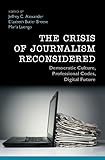The crisis of journalism reconsidered : democratic culture, professional codes, digital future
Title By: Alexander, Jeffrey C [Edited by] | Breese, Elizabeth Butler [Edited by] | Luengo, María [Edited by]
Material type: BookPublisher: New York : Cambridge University Press, c2016.Description: xvii, 298 p. : ill. ; 23 cm.ISBN: 9781107085251; 9781107448513 (paperback)Subject(s): Journalistic ethics | Journalism -- History -- 21st century | SOCIAL SCIENCE / Sociology / GeneralDDC classification: 174/.907 Online resources: Location Map
BookPublisher: New York : Cambridge University Press, c2016.Description: xvii, 298 p. : ill. ; 23 cm.ISBN: 9781107085251; 9781107448513 (paperback)Subject(s): Journalistic ethics | Journalism -- History -- 21st century | SOCIAL SCIENCE / Sociology / GeneralDDC classification: 174/.907 Online resources: Location Map | Item type | Home library | Call number | Status | Date due | Barcode | Item holds |
|---|---|---|---|---|---|---|
| REGULAR | University of Wollongong in Dubai Main Collection | 174.907 CR IS (Browse shelf) | Available | T0011912 |
, Shelving location: Main Collection Close shelf browser

|

|

|

|

|

|

|
||
| 174.9004 TA ET Ethics and technology : | 174.9004 TA ET Ethics and technology : | 174.9025042 CO CO Confronting the internet's dark side : | 174.907 CR IS The crisis of journalism reconsidered : | 174.907 ET HI The ethics of journalism : | 174.907 ET HI Ethics for digital journalists : | 174.907 JO UR Journalism ethics : |
Includes bibliographical references and index.
Machine generated contents note: Part I. Introduction: 1. Journalism, democratic culture, and creative reconstruction Jeffrey C. Alexander; Part II. The Crisis Narrative: 2. The perpetual crisis of journalism: cable and digital revolutions Elizabeth Butler Breese; 3. The crisis of public service broadcasting reconsidered: privatization and digitalization in Scandinavia Hakon Larsen; 4. Beyond administrative journalism: civic skepticism and the crisis in journalism Daniel Kreiss; 5. The many crises of Western journalism: a comparative analysis of economic crises, professional crises, and crises of confidence Rasmus Kleis Nielsen; 6. The crisis in news: can you whistle a happy tune? Michael Schudson; Part III. Fears of Digital News Media: The Symbolic Struggle: 7. When codes collide: journalists push back against digital desecration Mari;a Luengo; 8. Telling the crisis story of journalism: narratives of normative reassurance in Page One Matt Carlson; 9. Assembling publics, assembling routines, assembling values: journalistic self-conception and the crisis in journalism C. W. Anderson; 10. The constancy of immediacy: from printing press to digital age Nikki Usher; 11. News on new platforms: Norwegian journalists and entrepreneurs face the digital age Kari Steen-Johnsen, Karoline Andreas Ihlebaek and Bernard Enjolras; Part IV. Professional Journalism, Civil Codes, and Digital Culture: 12. Journalism in American regional online news systems David Ryfe; 13. Digital media and the diversification of professionalism: a US-German comparison of journalism cultures Matthias Revers; 14. Professional and citizen journalism: tensions and complements Peter Dahlgren; 15. Expressions of right and wrong: the emergence of a cultural structure of journalism Stephen F. Ostertag; Part V. Conclusion: 16. News innovations and enduring commitments Elizabeth Butler Breese and Mara Luengo.
"This collection of original essays brings a dramatically different perspective to bear on the contemporary "crisis of journalism." Rather than seeing technological and economic change as the primary causes of current anxieties, The Crisis of Journalism Reconsidered draws attention to the role played by the cultural commitments of journalism itself. Linking these professional ethics to the democratic aspirations of the broader societies in which journalists ply their craft, it examines how the new technologies are being shaped to sustain value commitments rather than undermining them. Recent technological change and the economic upheaval it has produced are coded by social meanings. It is this cultural framework that actually transforms these "objective" changes into a crisis. The book argues that cultural codes not only trigger sharp anxiety about technological and economic changes, but provide pathways to control them, so that the democratic practices of independent journalism can be sustained in new forms"--
